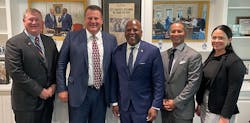AFL hones its dedication to the White House’s Build America, Buy America Act (BABA) initiative
A group of AFL’s top leadership team recently met with members of the Biden-Harris Administration to talk about how they support the Build America, Buy America Act (BABA) policies and funding for expanding broadband access and modernizing the power grid across America.
During the meeting, AFL officials met with Senior Advisor to the President and Director of the Office of Public Engagement, Stephen Benjamin, in Washington, D.C.
“AFL supports the Biden administration’s infrastructure initiatives, especially regarding universal broadband access and grid modernization,” said Jaxon Lang, President and CEO of AFL. “We believe that we are well positioned to make significant contributions to these initiatives and are prepared to make the necessary investments.”
BABA, BEAD momentum grows
A big focus of the White House’s BABA initiative is to maximize the economic potential of the Internet for All initiative. As the federal government prepares to review BEAD funding applications, AFL’s pledge to BABA will resonate with providers making vendor selections for fiber and other broadband network components.
It makes sense that AFL itself wants to emphasize its domestic capabilities as it gives providers and communities, some of which have little or no experience rolling out broadband, the ability to access supplier support and resources when issues arise with network rollouts.
One is creating a more robust domestic supply chain for broadband network components. AFL has offered fiber cable and components to service providers for nearly four decades with many products that meet BABA requirements. For products currently not fully compliant with national preference regulations, AFL is taking steps to gain domestic sources and manufacture its products in America.
“To ensure BABA requirements are appropriately captured and maintained throughout the manufacturing process, BABA (along with any other regulatory requirements) must be specified at the time of quotation and order to AFL,” Lang said in a letter to its customers.
Also, as a significant broadband supplier, AFL’s dedication to manufacturing the necessary construction materials domestically can create jobs and deliver affordable internet service to millions of Americans.
Vendors step up
Since BEAD funding is being doled out to each state, there will be a need to have local resources from companies that not only fulfill orders for equipment quickly but also be able to provide support.
AFL’s recent meeting with White House officials reflects a growing trend by an ever-increasing group of broadband-related vendors that will provide equipment and other components to providers that will roll out broadband to unserved and underserved homes via the BEAD program across the states.
But AFL is just one of many vendors making this move. Similar efforts are underway from other vendors like Calix, Nokia and STL.
As part of Calix’s Build America Buy America commitment, the company is moving jobs overseas to the US, beginning with a multi-million-dollar domestic manufacturing commitment to its partners Jabil, Gemtek and Hisense Broadband. In Michigan, Jabil will produce optical network terminals (ONTs) and optical line terminals (OLTs). Gemtek will produce ONTs at its California facility and Hisense Broadband will create optical modules at its New Jersey facility.
Nokia announced in August that it is partnering with Sanmina Corporation to manufacture products in Sanmina’s manufacturing facility in Kenosha, Wisconsin. The announcement makes Nokia among the first telecom equipment manufacturers to announce that core electronic components of its fiber equipment will be made in America. Set to begin operations in 2024, the Kenosha production plant is expected to bring up to 200 new jobs to Wisconsin.
Finally, STL launched a new manufacturing facility in Lugoff, South Carolina--The Palmetto Plant. Named after South Carolina’s state tree, the company said this facility, also designated as STL’s North American Headquarters, symbolizes STL’s commitment to the US market.
Spanning over 168,000 sq. ft, the Palmetto Plant will specialize in future-ready optical solutions, including high fiber count cables with smaller diameters. The emphasis will also extend to pioneering designs, notably high-capacity ribbonized cables and ruggedized designs for rural deployments.
Vendor BABA/BEAD programs
| AFL | Builds BABA-compliant products |
| Calix | Established manufacturing partnerships with Jabil, Gemtex and Hisense |
| Nokia | Launches manufacturing partnership with Sanmina Corporation |
| STL | Opened new manufacturing facility in Lugoff, South Carolina |
NTIA readies BEAD program awards
On June 30, NTIA announced its BEAD funding allocation to each state and territory, ranging from $3.3 billion (Texas) to $27.1 million (U.S. Virgin Islands). Nineteen states will receive more than $1 billion each in funding, including Alabama, California, Georgia, Louisiana, Michigan, Missouri, North Carolina, Texas, Virginia, and Washington. In December, each state and territory must submit an Initial Proposal describing how their BEAD-related grant program will be administered.
About the Author
Sean Buckley
Sean is responsible for establishing and executing the editorial strategy of Lightwave across its website, email newsletters, events, and other information products.

